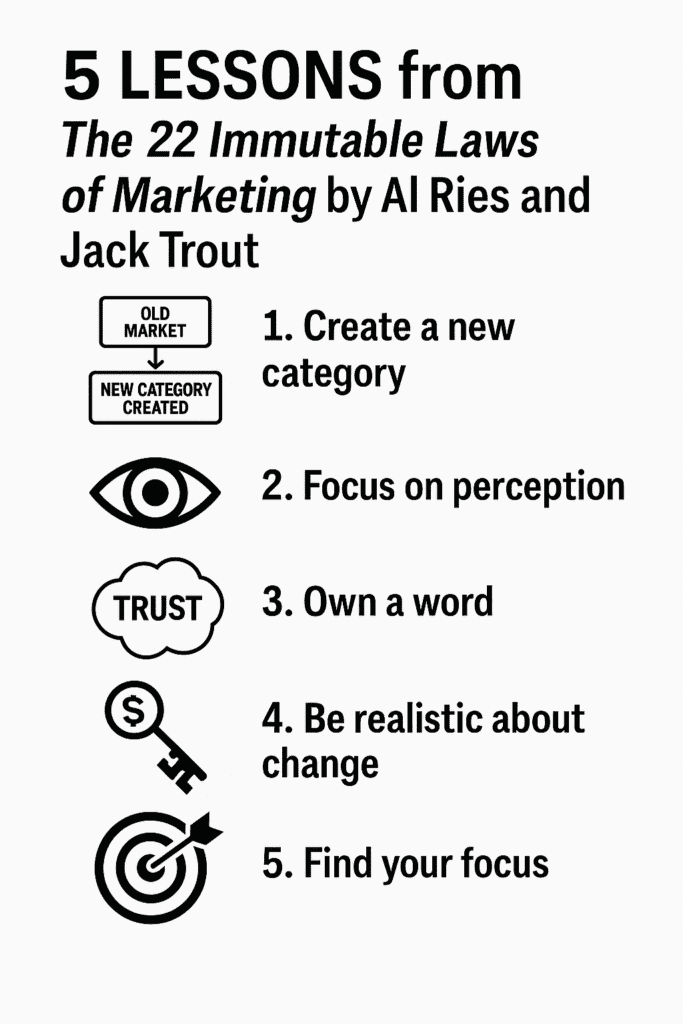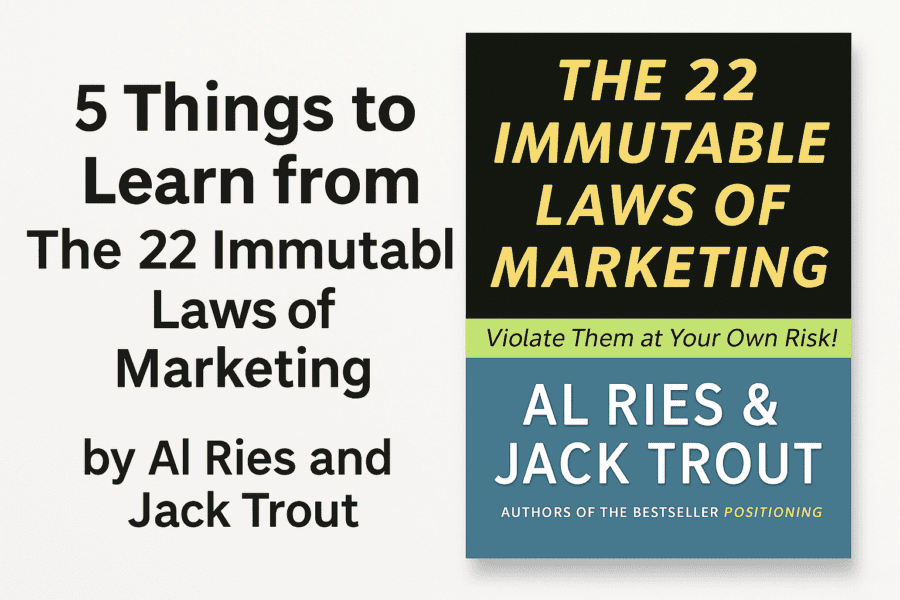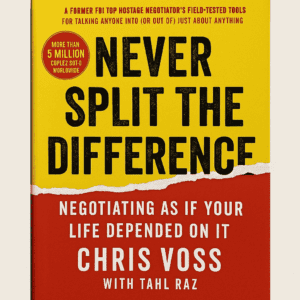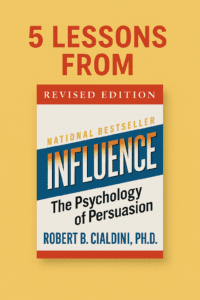This classic marketing book, The 22 Immutable Laws of Marketing, by Al Ries and Jack Trout cuts through the noise. First published in the early ’90s, it still speaks to anyone trying to build something real, especially if you’re juggling your side hustle with a day job and feel unsure where to start.
Here’s a wild stat: The average person sees over 5,000 ads a day. That’s the chaos you’re building your brand in.
They don’t offer hacks. They share 22 practical laws that help you stop guessing and start positioning your brand where it matters in your customers’ minds.
Table of Contents
Summary of The 22 Immutable Laws of Marketing by Al Ries and Jack Trout
Ries and Jack wrote The 22 Immutable Laws of Marketing to show you what works in marketing and what doesn’t. It’s not about trends or tactics. It’s about principles that have stayed true for decades. And if you’re building a brand, side hustle, or online business, you’ll want to pay attention.
Here’s what they say:
- It’s better to be first than better. If you’re not first, create a new category and own it.
- People buy based on perception, not product. What they think matters more than what you sell.
- Marketing is about owning a word in someone’s mind. FedEx owns “overnight,” and Volvo owns “safety.” What word will you own?
- Trying to be everything to everyone weakens your brand. Focus. Sacrifice. Drop what doesn’t matter.
- The market doesn’t reward arrogance. It rewards clarity, consistency, and candor.
- Failure is part of the process. Don’t fight it. Learn and move on.
They use real-world examples like Apple, Coca-Cola, and Burger King to show how these laws play out. You’ll see how New Coke flopped, how Avis won by admitting they were number two, and how trends beat fads every time.
This book doesn’t give you a step-by-step business plan. But it gives you the mental rules to play the long game.

If you want your idea to stick, if you want your product to matter, you need to know these laws.
They don’t promise shortcuts. But they do show you the map.
5 Lessons You Should Steal from The 22 Immutable Laws of Marketing by Al Ries and Jack Trout
They didn’t write this book for big companies with fat ad budgets. They wrote it for people like you, trying to build something with limited time, limited energy, and limited money. If you’re trying to grow a side hustle, an online store, or a brand around your name, these five lessons will keep you from wasting time on stuff that doesn’t move the needle.
1. It’s better to be first than it is to be better
This is the first law they talk about and for good reason. Most people don’t remember who came second. Not in sports. Not in business.
They explain how Apple didn’t just build a better smartphone. They were first to make the smartphone cool and user-friendly. And now they dominate.
Here’s what this means for you: Stop trying to be better than your competitors. Find a category or idea you can be first in. Even if it’s small.
Maybe you’re not the best productivity coach. But you could be the first productivity coach that focuses on GenZ creators. That’s a category. And it’s yours if you take it.
2. If you can’t be first, create your own category

They say if you can’t lead the race, change the race.
Dell wasn’t the first computer company. But they were the first to sell computers by phone. That tiny twist made them a $900 million business.
So ask yourself: What’s a new angle you can take on something old? You don’t need to reinvent the wheel. Just shift the frame.
You’re not just selling candles. You’re selling calming scents for work-from-home founders. That’s a category. Own it.
3. People don’t buy products. They buy perceptions.
This one hits hard. They say marketing is not about your product. It’s about what people think about your product.
Listerine tastes awful. But they owned it. Their slogan? “The taste you hate twice a day.” People believed if it tasted bad, it must work.
You don’t need to be perfect. You just need a strong position in your audience’s mind.
So here’s the takeaway: focus less on polishing your product. Focus more on shaping how people see it.
- What problem does it solve?
- How does it make people feel?
- What do you want to be known for?
Control the perception. That’s what builds trust.
4. Own one word in the customer’s mind
They say the most powerful brands are the ones that own one simple word.
Volvo owns “safety.” FedEx owns “overnight.” Domino’s owns “delivery.”

What’s the one word you want people to associate with you?
You don’t need a fancy logo or viral campaign to build a brand. You need focus.
If you’re all over the place, people won’t remember you. But if you repeat one message enough times, they will.
Think about your current project or business. What’s the one word it stands for? If you don’t know yet, that’s your next step.
5. Don’t fall for the pressure to do everything
This one’s called “the law of sacrifice.” They say if you want to succeed in marketing, you need to give up stuff.
That includes:
- Trying to reach everyone
- Offering too many products
- Changing directions too often
Most people mess up by doing too much. They think more features means more value. It doesn’t.
You need to focus. Cut the fluff. Stick to one audience. One product. One message.
You can’t afford to be everything. That’s how you get ignored.
So take a breath. Ask yourself: What do I need to let go of to move forward?
These five laws alone can save you months of confusion and help you focus on what actually works.
But this is just the beginning.
They wrote The 22 Immutable Laws of Marketing to give you a full playbook for building a brand that sticks. It’s packed with real examples and clear advice.
Want to go deeper?
Conclusion
If you’re serious about building something that lasts, The 22 Immutable Laws of Marketing is a book you need in your corner. They don’t teach you to chase trends. They teach you how to stay relevant by thinking clearly, acting with focus, and knowing your place in the market. You don’t need to do more. You need to do what matters.
And speaking of focus, if staying consistent with your goals feels hard, you’ll want to check out my blog post on Deep Work by Cal Newport. It’ll show you how to stay locked in when distractions won’t stop coming.




Pingback: Mindset by Carol Dweck ( 5 Lessons That’ll Change How You See Growth Plus Book Summary)